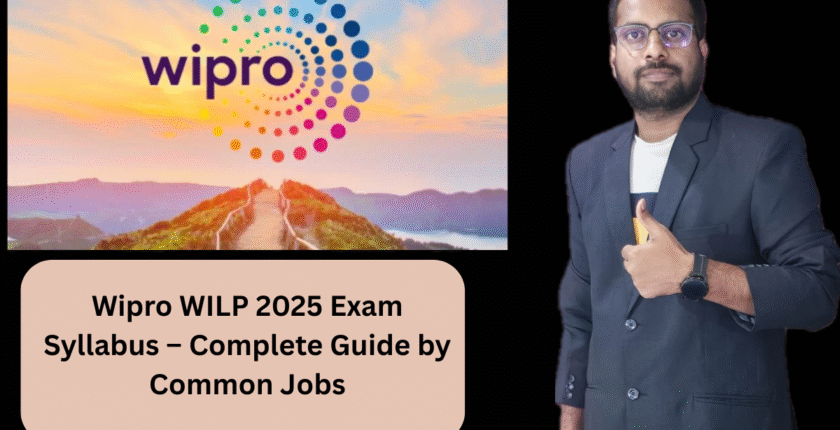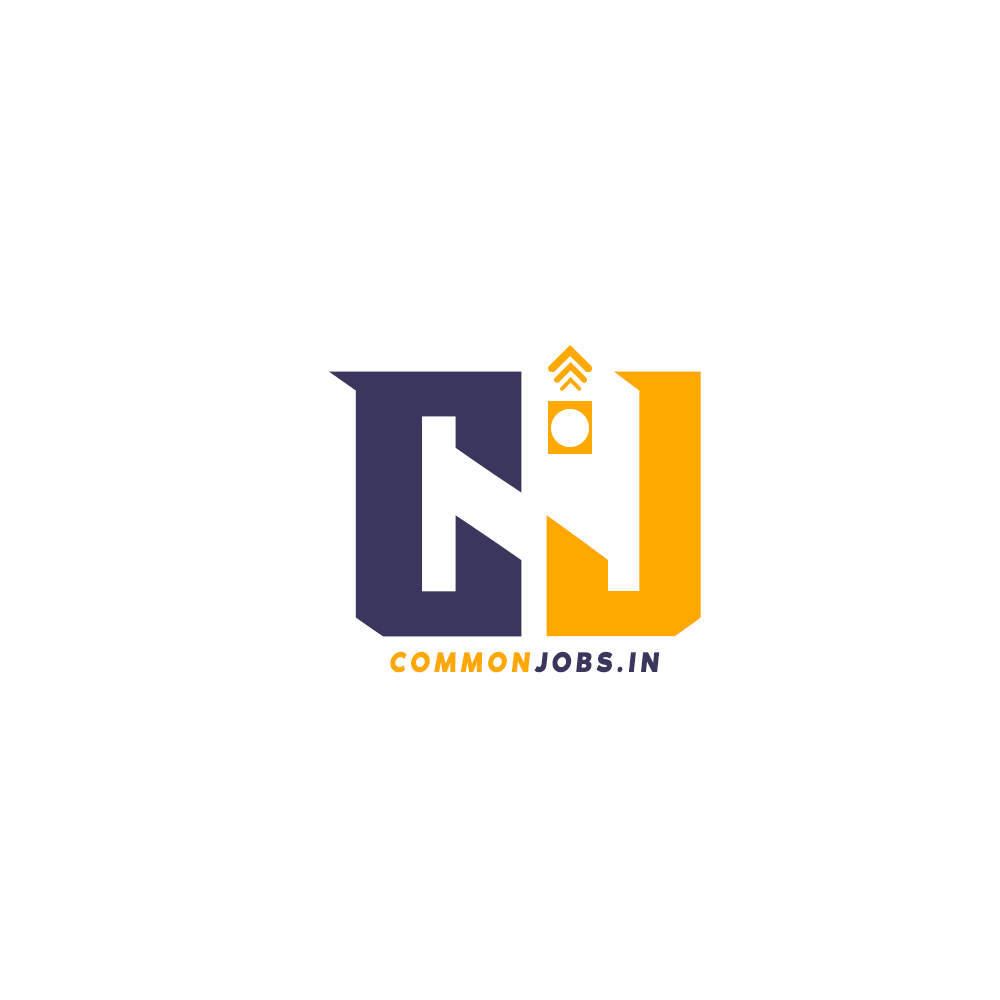Wipro WILP 2025 Exam Syllabus – Complete Guide by Common Jobs
Wipro WILP 2025 Exam Syllabus : Wipro’s Work Integrated Learning Program (WILP) is a unique recruitment initiative for fresh graduates who wish to combine real-job experience with higher education (typically an M.Tech) while working at Wipro. For the 2025 batch, this program offers a chance to gain full-time employment, a stipend, training and sponsored education. This article by CommonJobs breaks down the WILP recruitment process, eligibility criteria, selection stages and preparation strategy.
About Wipro WILP
Wipro’s WILP allows BCA or B.Sc graduates (in eligible streams) to join the company full-time and simultaneously pursue an M.Tech (or equivalent) that is sponsored by Wipro. This “earn-while-you-learn” model makes it a compelling opportunity for students from science and IT backgrounds.
Eligibility Criteria (WILP 2025)
Here are the general eligibility requirements for Wipro WILP 2025:
- Qualifications: BCA or B.Sc in eligible streams such as Computer Science, Information Technology, Mathematics, Statistics, Electronics or Physics.
- Academic Performance: Often minimum ~60% or 6.0 CGPA required.
- Batch: Typically 2024 or 2025 graduates eligible.
- Core Mathematics Requirement: Graduation must include a subject of Core Mathematics — business maths or applied maths may not be accepted.
- Gap and Backlog Rules: Up to 3 years gap before graduation allowed; no gaps during the graduation period (in many cases). One backlog might be allowed during assessment but must be cleared by a certain semester.
- Citizenship: Must be Indian citizen or PIO/OCI – citizens of Bhutan/Nepal might need citizenship certificate.
- Service Agreement: On selection, candidates often sign a service bond of 60 months (5 years).
Step 1: Online Registration & Eligibility Screening
Candidates register via Wipro’s careers portal or a dedicated job-platform link, submit their educational details, and ensure they meet all eligibility (percentage, subject stream, gaps, backlog). Ensure you read all conditions and upload accurate documents.
Step 2: Online Assessment
This is usually the first major screening round. The details:
- Duration: ~80 minutes.
- Sections:
- Verbal Ability: 20 questions / 20 minutes
- Analytical Ability: 20 questions / 20 minutes
- Quantitative Ability: 20 questions / 20 minutes
- Written Communication Test (Essay / one question) / 20 minutes
Candidates will need to clear cut-offs in these sections and show clarity in communication.
Step 3: Voice Assessment
After clearing the online assessment, candidates may face a voice assessment (spoken English round) to test clarity, pronunciation, comprehension and communication confidence.
Step 4: Business Discussion Round
This is more like an interview/discussion round rather than a strict technical test. The focus is on your thought process, fit for the role, ability to discuss business/tech situations, and alignment with Wipro’s values. On passing, candidates receive a Letter of Intent (LOI) or move to training phases.
Step 5: Pre-Skilling Training & LOI
Once you get LOI, you will undergo pre-skilling or training modules to prepare you for the full-time assignment and the educational portion (M.Tech) associated with WILP. On satisfactory completion, the final offer is given. Keep in mind the service agreement and clauses may be binding.
Step 6: Final Offer & Onboarding
On successful training and document verification, you’re formally onboarded at Wipro under the WILP program. You’ll receive your joining letter, stipend details, educational sponsorship information and begin your dual role of work + study.
Stipend, Bond & Key Highlights
- Candidates typically receive a monthly stipend that increases by year. Example: ~₹ 15,000 (+ ESI) in year 1; incrementing in subsequent years.
- Joining bonus: ~₹ 75,000 (in many campaigns) for WILP candidates.
- Service Agreement: 60 months. Leaving earlier may require you to pay the bonus back on a pro-rata basis.
Preparation Tips from CommonJobs
- Practice aptitude thoroughly: quantitative, analytical, verbal. Time yourself.
- Work on written communication: essay clarity, structure, grammar.
- Improve spoken English: voice rounds test this. Record yourself and practice.
- Study your graduation subjects well if in eligible streams: especially core mathematics.
- Be ready for discussion round: prepare basic knowledge of IT/business, your motivations, how WILP fits your career path.
- Read and understand the service agreement/bond before committing so you know what you’re signing up for.
- Keep your documents scanned and ready — mark-sheets, ID proofs, backlog clearance etc.
Wipro WILP 2025 Recruitment Process | Exam Pattern & Written English Test | All Details
Exam Pattern
| Section | Number of Questions | Time | Cutoff | Comments | Difficulty |
|---|---|---|---|---|---|
| Quantitative Aptitude | 20 | 20 minutes | 16 | No negative marking | Moderate |
| Logical Reasoning | 20 | 20 minutes | 16 | No negative marking | Easy |
| Verbal English | 20 | 20 minutes | 16 | No negative marking | Easy |
Wipro WILP 2025 Recruitment Process
Detailed Syllabus
Quantitative Aptitude Wipro WILP 2024
Focus on managing time effectively and remaining calm. Key topics include:
- Permutation and Combinations
- Profit and Loss
- Time & Work
- Speed and Distance
- Simple and Compound Interest
- Data Interpretation
- Mean, Median, Mode
You can find solved examples and previous year questions here:
Logical Reasoning Wipro WILP 2024
This section involves analytical and logical reasoning questions. Key topics include:
- Blood Relationships
- Directions
- Data Sufficiency
- Number Series Pattern Recognition
- Flowchart
- Visual Reasoning
- Statement & Conclusions
Verbal English Wipro WILP 2024
This section tests English grammar and comprehension skills. Key topics include:
- Reading Comprehension
- Sentence Correction
- Fact, Inference, Judgment & Opinion
- Vocabulary
- Sequencing
- Synonyms and Antonyms
- Spelling
Written English Test
After the aptitude exam, you will write a 200-word essay on given topics, which should be unique and non-plagiarized. Some previous topics include:
- Women empowerment
- Humans are Servants of Technology
- Digital India
- Hard work or Smart work
- Covid-19
- Online Classes or Offline Classes



